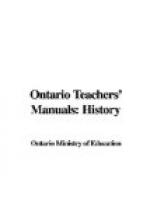Charles I held very strongly the belief in the “divine right” of kings and, naturally, this belief did not harmonize with the aim of Parliament. Disputes were constant:
1. Differences concerning Charles’ marriage.
2. First Parliament, 1626, would grant “tonnage and poundage” for only one year.
3. Second Parliament, 1626, refused money unless the conduct of the Spanish war by Buckingham was inquired into by Parliament.
4. Third Parliament, 1628-9. Charles raised some money by “forced loans,” but far too little, for a new war with France was begun. Parliament refused to grant money till the king signed the Petition of Right, which embodied all the points in dispute between them.
5. Charles did not long observe the Petition of Right which he had signed; Laud, Bishop of London, was making changes in the church ceremonies that seemed to bring back the old religion. Parliament solemnly protested against both these things, then quietly adjourned. Some members were arrested—Sir John Eliot died in the Tower—others were kept in prison for eleven years.
6. No Parliament for eleven years. Charles aimed during this period to raise money without Parliament, and to establish the English Church in the whole country.
His methods of raising money were:
(a) By granting monopolies (L200,000).
(b) By Star Chamber fines—large fines for slight offences.
(c) By illegal duties.
(d) By “ship-money” (Trial of Hampden).
His methods of establishing the English Church were:
(a) Religious oppression—chief agent, Laud; chief sufferers, the Puritans.
(b) Attempt to force the English Church prayer-book on Scotland led to rebellion.
This rebellion forced Charles to summon Parliament in order to raise money. Parliament refused to give money till their grievances were redressed. It was dissolved in three weeks. Urgent need of troops to keep back the Scottish rebels made Charles summon Parliament again in six months (1640). This is known as the “Long Parliament.”
7. (a) Parliament first accused Laud and Strafford.
(b) The “Grand Remonstrance” named the illegal acts of Charles.
(c) This led to Charles’ final blunder—the attempt to arrest the five members.
8. Open war, now the only way out, went on till Charles was captured and beheaded, and Parliament held, for a time, entire control.
SUGGESTIVE OUTLINES FOR REVIEWS
FORM IV
I. The Era of Reform in Britain:
1. The Methodist Revival,
which stirred the hearts of the people,
and gave them higher ideals
2. Social Reforms:
(a) Canning, the friend of the oppressed
(b) Wilberforce and
the abolition of slavery
(c) Elizabeth Fry
and prison reform
(d) Revision of the
criminal code




